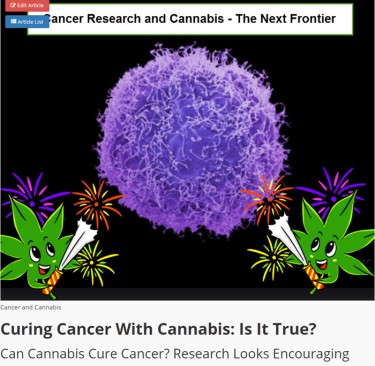
Cannabis is just as effective or better than cancer treatments, say most cancer patients in a new survey
Data from the journal Gynecologic Oncology Reports showed that most patients in gynecological oncology find cannabis products either as effective or even more effective than prescription drugs, which are aimed at reducing the symptoms of cancer.
Investigators at Yale New Haven Hospital interviewed 31 patients with gynecological oncology about their medical cannabis use. A total of 74% of the respondents received either immunotherapy or chemotherapy during the study period. A staggering 83% of them said marijuana was effective for treating symptoms, particularly insomnia, neuropathy, appetite, and anxiety, while most of them also felt that its effectiveness and safety were as or even better than with conventional prescription drugs.
“The majority of patients in our study believed that medicinal cannabis was equivalent or superior to other drugs (e.g., opioids, antiemetics, anxiolytics, and sleeping pills) in relieving their symptoms … By the subset of patients who opposed medicinal cannabis Using pain, 63 percent said opioid use was reduced … These data suggest that medicinal cannabis is a viable alternative or addition to drugs commonly used for cancer or treatment-related symptoms, ”the authors concluded.
No surprise there
While there are dozens, perhaps hundreds, of ways to medicate a range of diseases using cannabis, it appears to be particularly effective for those dealing with the Big C.
And the doctors agree.
A 2019 study published at the American Society for Clinical Oncology’s annual meeting found that a significant majority of oncologists believe cannabis can help their patients. However, the same study found that medical providers were not confident in recommending the correct dosage to their patients, but this is a common feeling among many.
Clearly, despite the ongoing challenges, there are so many benefits to using cannabis for the treatment of cancer, especially as a complement to existing therapies, including those approved by the FDA. Marijuana is well tolerated and safe by the vast majority, and side effects are rare. It helps cancer patients improve their appetite, fight nausea with chemotherapy, and sleep well. These problems are common in cancer patients who are undergoing radiation and chemotherapy.
Patients also see the benefits, even if not all doctors are convinced of the benefits.
“Doctors don’t usually advocate the use of cannabis products, but when you ask patients it’s amazing how many people are already taking or considering using them,” says Dr. Charu Agrawal, who specializes in palliative care at the Dan L Duncan Comprehensive Cancer Center at Baylor St. Luke’s Medical Center. “Most patients say they heard about it from friends or family.”
There are certain things to keep in mind when using cannabis for cancer treatment, such as: B. how it might react to medication the patient is already taking. For example, CBD tends to inhibit receptors that are responsible for metabolizing common drugs like methadone, antidepressants, opioids, and statins, resulting in much higher levels of the drugs in the blood.
“I tell my patients you need to let us know if you are taking THC or CBD, as are any over-the-counter drugs or herbal supplements,” says Agrawal. “Be open and honest about what you do and how much.”
“We need to remove the stigma,” she said. “I will let my patients know what the evidence is showing. But if a patient feels like they are helping, I will not tell them to stop unless it interferes with treatment. “
Tips on using cannabis as a cancer drug
If cannabis is legal in your state and you want to start experimenting with it as a medicine, why not?
Here are a few things to keep in mind:
Opt for all of herbal medicine. THC (tetrahydrocannabinol, the psychoactive compound) and CBD (cannabidiol, non-psychoactive) are both equally well-known components of cannabis. CBD is known for its anti-inflammatory properties and diverse health benefits, although there are many other compounds in the plant that are equally beneficial. For example, there are terpenes and cannabinoids that can play important roles in aiding your healing and wellbeing while enhancing each other’s benefits at the same time. And while THC is known for giving you that high, it also has important medicinal properties that shouldn’t be overlooked.
Because of this, it is always better to medicate with whole plant medicine rather than isolates, as you will miss out on the therapeutic benefits of each other.
Use cannabis as a complementary treatment instead of a panacea. Studies show that while cannabis speeds healing of numerous diseases, it is best not to use it as a panacea. Many doctors also believe that cannabis is best used in conjunction with other forms of medicine. So don’t use this as an excuse not to visit your oncologist again.
Be open to trial and error. For people new to cannabis, it takes a while to figure out the delivery method, strain, and dose that are best for your specific needs. Don’t be afraid to try new things as long as you are experimenting in the safety of your home and make sure that you are not doing dangerous things like driving when you are new to it.
Vape for quick results. There are many ways to consume cannabis, but for patients who need the quickest onset and results, vaping is the way to go. You can expect results in just 5 minutes, ideal for those struggling with chronic pain, nausea, or vomiting. However, if you want quick results, stay away from foods that can take effect in an hour or even more.
Let your doctor know. This is extremely important; If they are unsure about prescribing cannabis for you, they can refer you to someone who is. You also don’t want to run the risk of cannabis interacting with other drugs.
CANNABIS AND CANCER, READ THIS …

CANNABIS CURES CANCER, NOT SO FAST, READ HOW IT WORKS!

Post a comment: